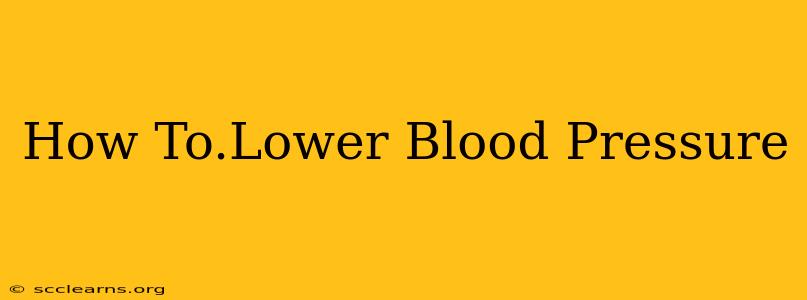High blood pressure, or hypertension, is a serious health concern affecting millions worldwide. It significantly increases your risk of heart disease, stroke, and kidney failure. Fortunately, you can take control of your blood pressure through lifestyle changes and, in some cases, medication. This guide explores natural and effective ways to lower your blood pressure and improve your overall health.
Understanding Your Blood Pressure
Before diving into solutions, it's crucial to understand what blood pressure is and why it matters. Blood pressure is the force of your blood pushing against the walls of your arteries. It's measured in two numbers: systolic (the top number) and diastolic (the bottom number). High blood pressure is generally defined as a reading consistently above 140/90 mmHg.
Why is High Blood Pressure Dangerous?
High blood pressure damages your blood vessels over time, making them less elastic and more prone to blockages. This increases the risk of:
- Heart attack: High blood pressure strains your heart, making it work harder and increasing the risk of heart attack.
- Stroke: Damaged blood vessels can rupture, leading to a stroke.
- Kidney failure: High blood pressure can damage your kidneys, leading to kidney disease.
- Heart failure: The constant strain on your heart can eventually lead to heart failure.
Natural Ways to Lower Blood Pressure
Many lifestyle modifications can significantly impact your blood pressure levels. These changes not only lower your blood pressure but also contribute to your overall well-being.
1. Diet Plays a Crucial Role
DASH Diet (Dietary Approaches to Stop Hypertension): This diet emphasizes fruits, vegetables, whole grains, lean protein, and low-fat dairy. It's low in saturated and trans fats, cholesterol, and sodium. The DASH diet has been proven highly effective in lowering blood pressure.
Reduce Sodium Intake: Sodium is a major contributor to high blood pressure. Limit processed foods, fast food, and salty snacks. Read food labels carefully and choose low-sodium options.
Increase Potassium Intake: Potassium helps balance sodium levels in your body. Good sources include bananas, potatoes, spinach, and beans.
2. The Power of Exercise
Regular physical activity is essential for lowering blood pressure. Aim for at least 150 minutes of moderate-intensity aerobic exercise per week, such as brisk walking, jogging, swimming, or cycling. Even short bursts of activity throughout the day can be beneficial.
3. Manage Stress Effectively
Chronic stress can significantly raise blood pressure. Find healthy ways to manage stress, such as:
- Meditation: Regular meditation can help lower stress hormones.
- Yoga: Yoga combines physical postures, breathing techniques, and meditation to promote relaxation.
- Deep breathing exercises: Simple deep breathing exercises can help calm your nervous system.
4. Maintain a Healthy Weight
Being overweight or obese significantly increases your risk of high blood pressure. Losing even a small amount of weight can make a big difference. Combine a healthy diet with regular exercise for optimal weight management.
5. Limit Alcohol Consumption
Excessive alcohol consumption can raise blood pressure. If you drink alcohol, do so in moderation.
6. Quit Smoking
Smoking damages your blood vessels and increases your risk of high blood pressure. Quitting smoking is one of the best things you can do for your overall health.
When to See a Doctor
While lifestyle changes can be highly effective, it's crucial to consult your doctor if you have high blood pressure. They can monitor your blood pressure, diagnose any underlying conditions, and recommend appropriate treatment, including medication if necessary.
Disclaimer: This information is for general knowledge and does not constitute medical advice. Always consult your doctor before making any changes to your diet or exercise routine, especially if you have pre-existing health conditions. Self-treating can be dangerous. The information provided here should be considered alongside professional medical guidance.

